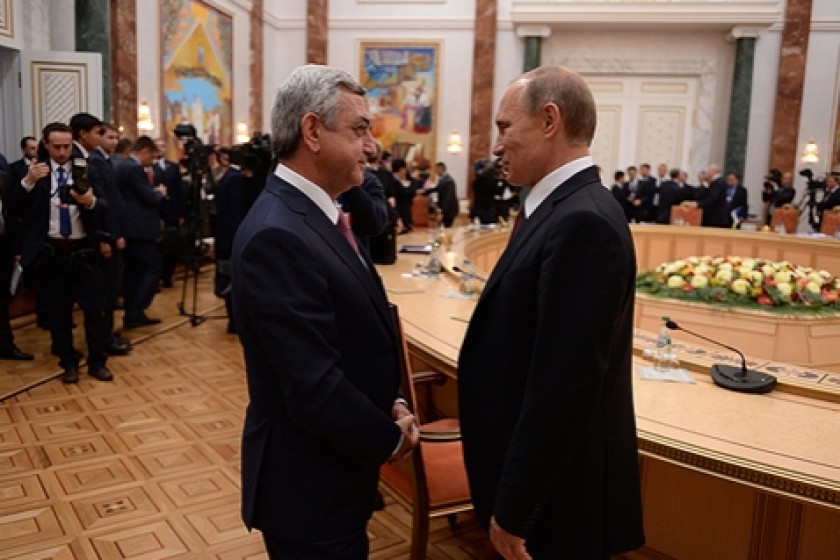Re: Eurasian Customs Union
Positive, Negative Influences Of EEU Membership On Armenia ‘Relative’
Hovannes Shoghikian
Հրապարակված է՝ 31.10.2014
The International Monetary Fund (IMF) estimates positive and negative influences of membership in the Eurasian Economic Union (EEU) on the Armenian economy as relative, the organization’s resident representative in Armenia said on Friday.
Against the backdrop of some expert opinions suggesting that Armenia’s entry into the Russian-led trade bloc will only bring losses for the country’s economy, considering the high customs duties applied by the member states, Teresa Daban Sanchez spoke about some positive factors of EEU membership. She, in particular, pointed out that Armenia is entitled to exemptions on 750 names of products. Another major factor, according to the IMF official, is that customs houses between the members of the trade bloc will be removed.
“It will facilitate trade with Russia and will offer Armenia greater opportunities of extending to the Russian market,” she said, adding that Armenia will also get a share of the overall annual customs revenues of the EEU estimated by some media at around $200 million.
According to Sanchez, there are other important aspects that may not be found anywhere in the document, but have been part of the negotiations. “For example, the gas agreement reached for five years which provides some stability for the future of energy prices and enables Armenia to think about strategy for the future,” said the IMF representative.
Asked by RFE/RL’s Armenian Service to point out the negative aspects of Armenia’s membership in the EEU, Sanchez said that “everything is relative”.
Among the risks she mentioned the circumstance that the Armenian economy appears to be growing more sensitive to what is happening in the Russian economy. “On the one hand, we will see a positive effect, on the other hand, there will be greater dependence on the Russian economy. And given geopolitical tensions as well as structural problems of the Russian economy, according to our forecasts, the Russian economy will register zero growth. Therefore, Armenia will find itself in a situation where its main trading partners do not provide rapid growth,” Sanchez emphasized, describing it as a challenge for Armenia to pay heed to.
The IMF has not changed its forecast regarding Armenia’s economic growth. Still a month ago it predicted that the Armenian economy will expand by 2.6 percent in 2014. The Armenian government is looking for a 4-percent economic growth at the end of the year.
Positive, Negative Influences Of EEU Membership On Armenia ‘Relative’
Hovannes Shoghikian
Հրապարակված է՝ 31.10.2014
The International Monetary Fund (IMF) estimates positive and negative influences of membership in the Eurasian Economic Union (EEU) on the Armenian economy as relative, the organization’s resident representative in Armenia said on Friday.
Against the backdrop of some expert opinions suggesting that Armenia’s entry into the Russian-led trade bloc will only bring losses for the country’s economy, considering the high customs duties applied by the member states, Teresa Daban Sanchez spoke about some positive factors of EEU membership. She, in particular, pointed out that Armenia is entitled to exemptions on 750 names of products. Another major factor, according to the IMF official, is that customs houses between the members of the trade bloc will be removed.
“It will facilitate trade with Russia and will offer Armenia greater opportunities of extending to the Russian market,” she said, adding that Armenia will also get a share of the overall annual customs revenues of the EEU estimated by some media at around $200 million.
According to Sanchez, there are other important aspects that may not be found anywhere in the document, but have been part of the negotiations. “For example, the gas agreement reached for five years which provides some stability for the future of energy prices and enables Armenia to think about strategy for the future,” said the IMF representative.
Asked by RFE/RL’s Armenian Service to point out the negative aspects of Armenia’s membership in the EEU, Sanchez said that “everything is relative”.
Among the risks she mentioned the circumstance that the Armenian economy appears to be growing more sensitive to what is happening in the Russian economy. “On the one hand, we will see a positive effect, on the other hand, there will be greater dependence on the Russian economy. And given geopolitical tensions as well as structural problems of the Russian economy, according to our forecasts, the Russian economy will register zero growth. Therefore, Armenia will find itself in a situation where its main trading partners do not provide rapid growth,” Sanchez emphasized, describing it as a challenge for Armenia to pay heed to.
The IMF has not changed its forecast regarding Armenia’s economic growth. Still a month ago it predicted that the Armenian economy will expand by 2.6 percent in 2014. The Armenian government is looking for a 4-percent economic growth at the end of the year.









Comment